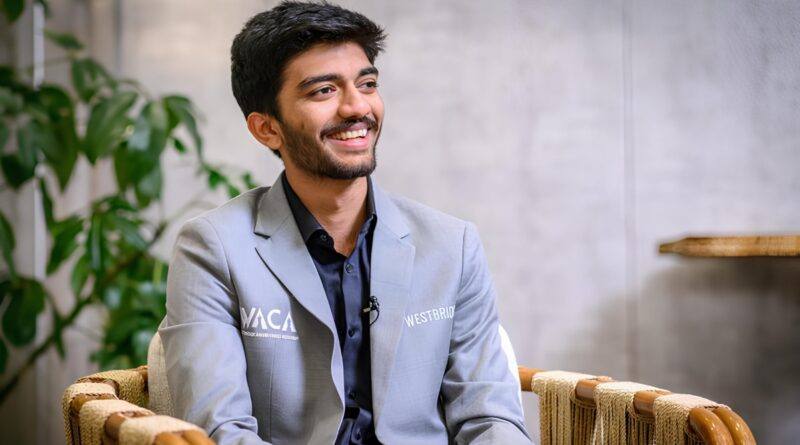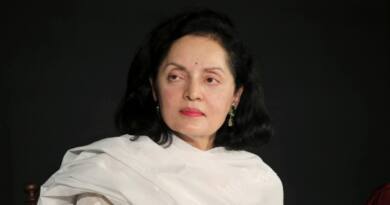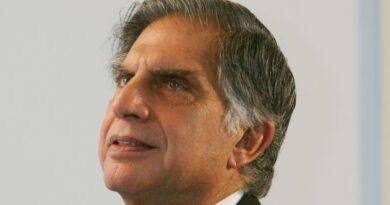Meet The New Youngest Chess Champion Of The World
Gukesh’s success is by no means his alone; it is a result of his parents’ struggle, hard work, and sacrifice in raising a world champion all by themselves.
Having defeated reigning title holder Ding Liren of China, D Gukesh, barely eighteen years old, has become the youngest and eighteenth chess World Champion. After Viswanathan Anand, who won five titles until handing the crown to Magnus Carlsen in 2013, this triumph ranks second for a world champion from India. Though it seems almost scripted, this is a real story of bold dreams, unrelenting effort, and unflinching support.
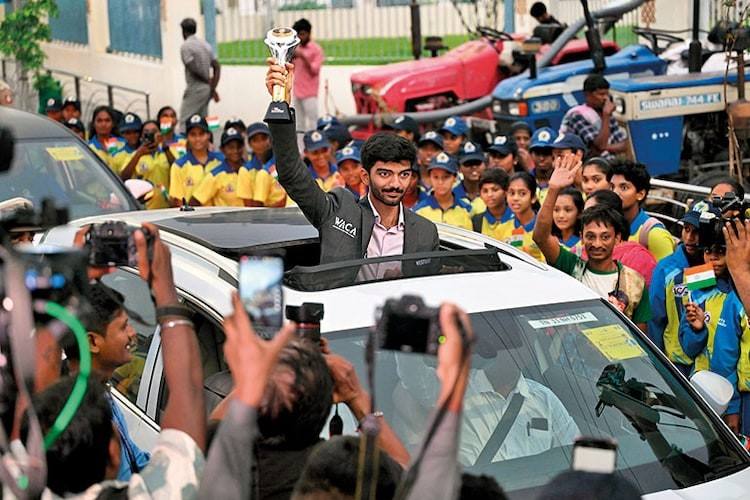
Many of us who have followed his path will not find this hyperbole. I still clearly recall an 11-year-old Gukesh excitedly stating his goal: to be the youngest global chess champion in a conversation with Sagar Shah of ChessBase India. This reminds us strongly that committing oneself to strong goals and having them will produce amazing results. Behind Gukesh’s triumph comes a tale of enormous sacrifice, mostly from his parents.
“My congrats to D Gukesh on his victory today,” Garry Kasparov says in a lovely message. Making his mother pleased, he has ascended the highest mountain of all! This line really speaks to me since Kasparov himself has often discussed the sacrifices his own mother made to enable his chess career.
— Kasparov 63 (@Kasparov63)
In India, where parents typically prioritise academics above everything else, Gukesh’s parents decided to take a different approach. Putting aside social expectations and their own comforts to enable their son to follow his passion, they decided to believe in his abilities.
Seeing Gukesh’s success reminds one of what parenting can be. Children deserve the flexibility and support to pursue their dreams in chess, dance, or arithmetic as well. If we let go of traditional concepts of success and only encouraged them, who knows what they might achieve?
Gukesh’s triumph also reflects India’s rising athletic power. Not ten years ago, the tools, infrastructure, and mindset required to raise a champion like him did not exist. Supported by a venture capital firm, academies like WACA (WestBridge Anand Chess Academy) nowadays play a major influence on future potential. Supporting a great chess player is no simple task; it calls for continuous financing, world-class training, and a network of elite seconds, coaches, and trainer assistants.
Among the most well-known personalities in the chess world—Grzegorz Gajewski, Radoslaw Wojtaszek, Pentala Harikrishna, Jan-Krzysztof Duda, Paddy Upton, and others—Gukesh’s winning squad was boldly announced and acknowledged in the post-game press conference. Such knowledge is not cheap, and this ecosystem reflects a mix of global brilliance and Indian vision, therefore highlighting the development we have made as a country in supporting sports.
Beyond his performance, Gukesh is unique because of his maturity and honesty. Given someone so young, his composure and emotional intelligence at the news conference were amazing.
I couldn’t help but wonder how grounded he is as he gracefully and modestly answered enquiries.
Ding made a one-move blunder in an otherwise drawn game (55.Rf2, an offer for a rook deal) in the last minutes of Game 14, almost at the conclusion, and viewers around the globe sprang out their chairs in shock. Live feeds erupted in chaos and celebration, but Gukesh stayed calm. Extreme calm, he examined his situation, drank some water, and exchanged coolly rooks. He was winning, yet he showed monk-like control and restrained any obvious enthusiasm.
Moments later, Gukesh let himself smile at last, knowing he had won the tournament after more trading bishops and obtaining a clear pawn advantage. Still, his appreciation of the game and his opponent stood out even in this triumphant moment. Gukesh got up from his chair and turned away while Ding considered his resignation so his response would not come out as rude.
Gukesh is unique mostly in his cultural confidence. In a society where many young people follow fads and popular culture, Gukesh remains true to himself. Before games, he meditates with closed eyes; he wears a tripundra or vibhuti on his forehead; following his triumph, he touched the chessboard and his eyes—a customary Hindu thank you. His capacity to remain rooted while shining on the international scene makes a strong statement: you can cherish your background and still be a worldwide champion.
Gukesh’s narrative transcends mere chess. It is about parenting, tenacity, and India’s development. Maintaining integrity while setting high goals is crucial. Most of all, it’s about believing in your children, in your goals, and in the knowledge that brilliance may originate from anywhere.
World Champion Gukesh on becoming a new multimillionaire: I do not engage in money-driven chess.

Following the World Chess Championship victory, India’s D Gukesh became one of the multi-millionaires. Still, the 18-year-old Chennai prodigy claims that his love of the game is not motivated by money.
Gukesh expects to receive Rs 11.45 crore in prize money following his victory in the Chess Championship. Youngest world champion Gukesh maintains he doesn’t engage in money-driven chess playing. Chess has always brought unmitigated delight for Gukesh, he says.
For the new world champion, D Gukesh, the “multi-millionaire” tag does “mean a lot,” but he claims he doesn’t play the game for financial benefit. Rather, he plays for the unfettered delight it offers—something he has loved ever since a chessboard was the “coolest toy” for him.
Now Rs 11.45 crore richer, Gukesh, the 18-year-old from Chennai, will get a prize from FIDE for overcoming China’s Ding Liren in the final. While his mother Padmakumari, a microbiologist, became the family’s only provider, Gukesh’s father, Rajnikanth, gave his profession as an ENT surgeon up for sacrifice to help his son on the chess tour.
“We had some difficult family considerations when I first started playing chess. Particularly with regard to finances, my parents gave much and endured hardships. Gukesh said in an interview with FIDE, “Today we are in a better place, and it means a lot that they do not have to worry about these things anymore.”
Chess has always brought unbounded delight for Gukesh.” I am still the youngster that enjoys chess. He underlined the timeless simplicity of his devotion when he commented, “When I first got my chess board, it was the coolest toy I had.”
Gukesh added, “For me, my parents are everything,” appreciating his mother’s constant emotional and spiritual support as well as his father’s managerial position. “She always reminds me that even if it’s fantastic to be a great chess player, it’s even better to be a greater person,” he said.
Gukesh stays modest about his trade even with his enormous victory. “You will come to see how little you know about chess the more you study it. Even the best players make mistakes, so, even with enhanced technology, there is still much to learn,” he said.
The world champion compares chess to a trip through “unlimited beauty.” “I pick something fresh every time I play. It’s the process that most interests me,” he remarked, also noting the significance of outcomes.
“I will be depressed if I miss a beautiful game, but if I win, even if I did not play very well. Though the route is equally crucial, the destination counts.” Gukesh said.
Gukesh’s desire to win outweighed his fear of losing; else his performance in the final against China’s Ding Liren may not have been exceptional. He showed slight astonishment at Liren’s measured approach, especially in the second game when his opponent chose a draw.
“He should have pushed more, but I wasn’t surprised by his safer strategy,” Gukesh said, noting that his freedom to attack finally brought about his success.
Dance, ice creams, and little joys.
Gukesh enjoys basic pleasures and is still an adolescent at heart, despite his recent glory. To his delight, his spontaneous dance following the Chess Olympiad went online and became rather popular. “I’ve always been the one sitting in the corner, watching my friends dance.” “Now, however, they are urging me to participate after seeing that video,” he said.
Gukesh is eager to break the dry run following a self-imposed year-long ice cream ban. “I’ve not had ice cream in a year. Perhaps now I’ll indulge myself,” he remarked, smiling, also appreciating a Singaporean chef who kept him going with his beloved South Indian cuisine during the championship.
Gukesh stays grounded as the world celebrates its new champion, evidence of his love of the game and character. “At the end of the day, I play chess because it brings me joy,” he stated, a straightforward but significant comment from a young guy with a promising future ahead.
Gukesh’s triumph confirms India’s chess superpower status.
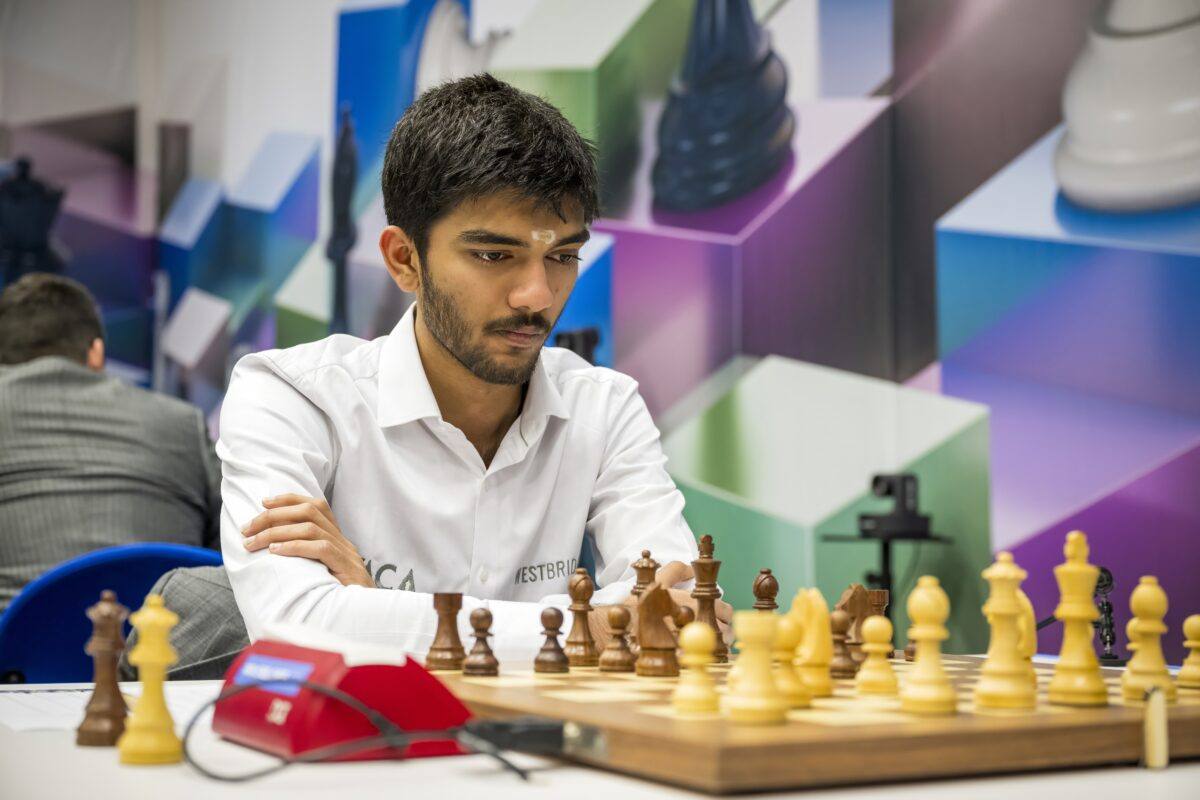
A nation of billions will always carry the image of a joyful D Gukesh standing with outstretched palms.
The event, which followed his triumph over Ding Liren of China in the World Chess Championship in Singapore, was a bold statement about India’s ascent as a real global chess superpower in the post-Viswanathan Anand era.
Designed by Anand personally, the year 2024 was a narrative of rebirth in Indian chess.
Now having a role model to follow is an 18-year-old from Chennai, the youngest ever world champion in the lengthy history of chess. The fearless and aspirational teens, or “Vishy’s children,” as Garry Kasparov called them.
But that success started in April during the FIDE Candidates event.
The Gukesh Milestone
With 14 rounds, Gukesh was considered the preferred one going into the championship games. That tag itself might have been a trigger for pressure. But the Indian sealed an epic achievement with victories in Games 3, 11, and 14.
Gukesh showed great clarity of mind by carrying the hopes of a whole country on his fragile shoulders.
But a morsel of credit should also go to a highly efficient and diversified support staff, including eminent mental fitness coach Paddy Upton and Anand, the founder of the chess revolution in India.
Chess Olympiad Conquer
In September, in Budapest, India showcased their impressive collection of chess champions to the world before Gukesh took the stage. The nation left with six gold medals in both team and individual divisions.
With their women counterparts subjugated, Azerbaijan joined China and erstwhile USSR, the only three countries to capture the men’s and women’s gold medals in the same edition of the event. India overcame Slovenia in the men’s team category final.
Gukesh (Board 1), Arjun Erigaisi (Board 3), Divya Deshmukh (Board 3), and Vantika Agarwal (Board 4) left the individual part with gold medals.
Siblings dazzle
Two Grandmasters from the Chennai Rameshbabu family—R Praggnanandhaa and Vaishali—had crossed the 2500 ELO ratings last year. They added still more feather to an already rising cap this year as the first siblings to participate.
They are also the first siblings meeting the GM standard.
Pragg defeats Carlsen.
Perhaps the best player in knots anywhere? Not unfamiliar to Praggnanandhaa, who he has defeated earlier in Rapid and Blitz forms, is Magnus Carlsen.
But winning World No. 1 in the classic version is a completely different task. Praggnanandhaa accomplished this in the May Norway Chess, Carlsen’s domestic event.
Erigaisi’s and Divya’s milestone
Though more technical, this is still really important. Erigaisi became the second Indian, naturally following Anand’s crossing of the 2800 Elo rating points.
To accomplish this uncommon feat, the Indian overcame Dmitry Andreikin, Russia’s fifth round European Chess Club Cup 2024. To surpass this benchmark, he was also the fifteenth GM in chess’s annals.
With 2801 points behind Carlsen (2831), Fabiano Caruana (2805) and Hikaru Nakamura (2802), Erigaisi is currently world number 4.
This year Divya crossed the 2500 Elo rating barrier to join a top club of GMs.
A huge pool of talent
The frontline men are Gukesh, Praggnanandhaa, Erigaisi, Vidit Gujrathi, and P Harikrishna; D Harika, Vaishali, Divya, Vantika, and Tanya Sachdev make a strong women’s lineup.
But that is where Indian chess really excels.
“These are well-known names since they have earned multiple honours. Still, the fact that thousands of children are currently playing chess makes India a powerful chess country. Now they wonder, “Why can’t we do this?” says DP Anantha, Vice President of the All India Chess Federation, after seeing Gukesh or Praggnanandhaa ascend heights.
“Our genuine strength is that growing pool of talent. In that sense, I do not believe any other country can equal us right now. Next year, we will see some young names emerging,” he said.
Maybe it’s appropriate to use a catchline from the 1980s to characterise India’s current chess scene: “Neighbours Envy, Owner’s Pride.” Great 2025 loading India stands fourth on the FIDE team list right now. With an average Elo rating of 2668 and a considerable majority of them less than 25, the country has 64 Grand Masters.
Many of them will be in action in events such as the Asian Championships in the UAE, FIDE Women’s GP, FIDE Women’s World Cup in Georgia, and Freestyle Chess Grand Slam Tour.
Moving Forward… What next?
Gukesh will be facing two players who assisted him in lifting the World Chess Championship in the Tata Steel event in January.
D. Gukesh is looking forward to the next tournament following his historic victory at the World Chess Championship in Singapore. Starting on January 17, the Tata Steel event at Wijk aan Zed in the Netherlands will be a unique challenge for him: he will compete against two men who had assisted in his world title triumph.
A strong lineup for the competition includes Vincent Keymer and P. Harikrishna. How then would it be working against them when they enabled him to become, at eighteen, the youngest world champion in history?

Every player is quite strong on the pitch; most of them are good buddies off the board and will be competitive. But generally they are all my adversaries, and Vincent and Hari are no different. We shall have fun off-board and fight hard on board!
-Gukesh Dommaraju
Keymer and Harikrishna were guiding Gukesh from Spain. They would prepare and forward the details to coach Grzegorz Gajewski, who was with Gukesh in Singapore.
Let us know a bit more about him in detail.
Born May 29, 2006, in Chennai, India, Gukesh Dommaraju is an Indian chess grandmaster and currently the global chess champion.
The youngest chess world champion, Gukesh defeated incumbent world champion Ding Liren in December 2024 by a margin of 7.5 to 6.5 points, therefore gaining the Fédération Internationale des Échecs (FIDE-International Chess Federation) World Chess Championship.
At the age of 12 years, 7 months, and 17 days, he became a grandmaster; only Sergey Karjakin of Ukraine and Abhimanyu Mishra of the United States met the mark at a younger age. Achieving the milestone in August 2023, Gukesh is the youngest player to surpass the 2750 FIDE rating threshold.
Early life and career

At seven years old, Gukesh began learning chess from three lessons a week. He started attending weekend events after his chess teachers commended his ability. He was participating in week-long rating competitions in a year. Both of his parents, doctors, had to make several lifestyle changes; for instance, his father, an ear, nose, and throat surgeon, shifted to part-time work while his mother, a microbiologist, picked up extra work shifts. For chess competitions, his father would travel with Gukesh. Gukesh studied in Chennai’s Velammal Vidyalaya School, which let him skip lessons and merely show up for tests so he could concentrate on chess.
Having won the under-nine category at the Asian School Chess Championships, Gukesh attained the candidate master title in 2015. His path to international master (IM) was quick; he met the required three IM standards in six months. In chess, norms are set performance criteria a player must meet in particular FIDE-approved events. At the March 2018 Cappelle la Grande Open, he scored 7 out of a possible 9 points to reach his last norm and qualify as an IM. He won five golds in under-12 individual rapid, under-12 individual blitz, under-12 classical, under-12 blitz team, and under-12 rapid team events the next month at the Asian Youth Chess Championships.
Becoming a grandmaster (GM) came next for Gukesh. His first GM norm came from the Bangkok Open in April 2018; his second came from Serbia in December 2018. December 2018’s Sunway Sitges International Chess Festival gave him an opportunity to establish his final norm; had he been successful, he would have become the youngest grandmaster in history. He fell short, though, as his must-win last game turned out as a draw.
Gukesh had to wait just one more month to graduate as GM. Gukesh, then 12 years, 7 months, and 17 days, won his third GM norm at the Delhi International Grandmaster Open, missing the record for youngest GM at the time—set by Karjakin—by just 17 days. Since then, Mishra has beaten the record at 12 years, 4 months, and 25 days. Moving from his initial IM norm to his last GM norm, Gukesh participated in an amazing 276 games in 30 events in 13 countries in just 16 months.
As a Grandmaster
Since turning grandmaster, Gukesh kept performing brilliantly. With 8 out of a possible 9 points in a tournament run by the Hillerod Chess Club in Denmark in February 2020, he won the Cannes Chess Festival a week later with 7.5 out of a total possible 9 points. Gukesh assisted his team, India 2, in finishing third at the 2022 FIDE Chess Olympiad, held in Chennai, his native city. With 8 wins in his 11 games, he earned the gold medal on board one, where top-ranked players square off in a round-robin style.
Gukesh upset Magnus Carlsen in the Aimchess Rapid online competition in October 2022, becoming the youngest player to defeat Carlsen in an official game since the latter became world champion. Gukesh broke a record previously held by Carlsen in August 2023 when he became the youngest player to exceed the 2750 rating. Reaching the quarterfinals before falling to Carlsen, Gukesh competed in the August 2023 FIDE Chess World Cup. Breaking India’s first GM and former world champion Viswanathan Anand’s 37-year reign on the rank, Gukesh became the highest-ranked Indian player in the revised FIDE ratings published a month later.
Gukesh helped India win its first gold in the men’s team event at the 2024 Chess Olympiad in Budapest; the gold went to India’s women’s team as well. With 8 victories and 2 draws in his 10 games, he once more took home a gold medal on board one.
Road to the World Championship
Gukesh qualified for the 2024 Candidates Tournament in December 2023, which would help ascertain who would be entitled to face the current world champion (Ding at the time). Though the latter, a former championship runner-up herself, had already qualified for the Candidates by virtue of finishing third in the 2023 FIDE Chess World Cup, therefore opening the seat for Gukesh. Gukesh had finished second in the 2023 FIDE circuit behind Fabiano Caruana. Along with Indians Praggnanandhaa Rameshbabu and Vidit Gujrathi, rounding out the eight participants were Ian Nepomniachtchi, Hikaru Nakamura, Nijat Abasov, and Alireza Firouzja.
Thought of as an underdog at the Candidates Tournament, Gukesh returned from a setback to Firouzja to win five games and acquire a half-point lead before the last round. Gukesh required a win in his last round versus Nakamura for an absolute triumph; a tie might have resulted in a playoff should Nepomniachtchi or Caruana win their last game, in which they were facing each other. Gukesh won, though, since both of the Gukesh-Nakamura and Caruana-Nepomniachtchi games finished in draws. At seventeen years, ten months, and twenty-four days old, he became the youngest player to win the Candidates tournament. He shattered the almost 40-year record set by chess master Garry Kasparov, who had been just shy of 21 years old when he captured the title in 1983–1984.
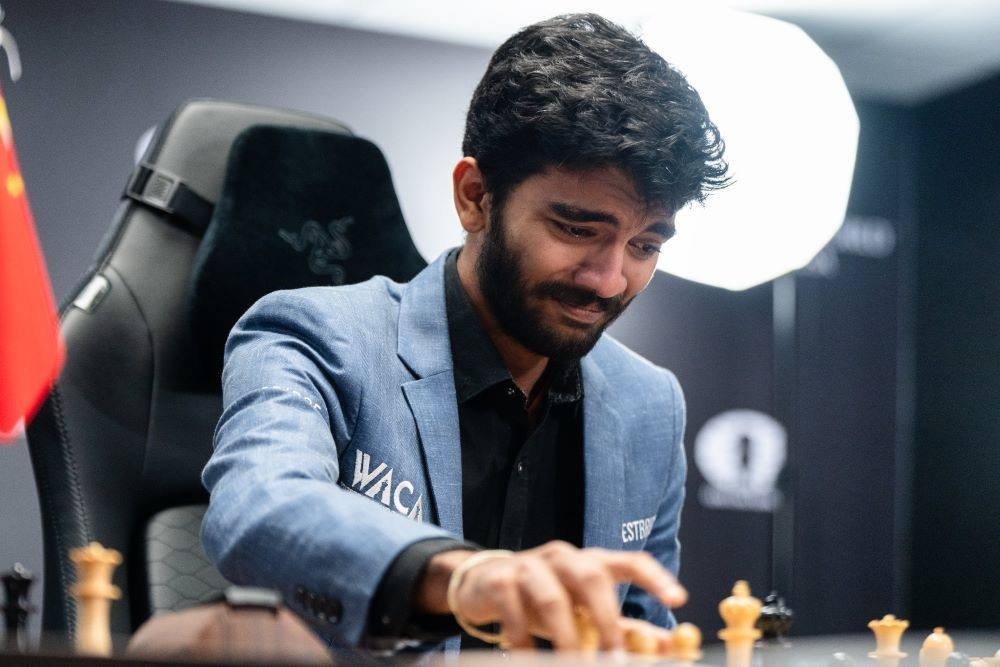
Held in Singapore from November 25 to December 13, 2024, Gukesh took on Ding in the 2024 FIDE World Chess Championship. There were 14 games; the first player to reach 7.5 points was proclaimed the winner; fast games would be utilised should the participants draw at 7 points each following 14 games. Though he was the challenger, Gukesh started the event ranked higher than Ding.
Gukesh began with White but lost the first game to Ding; he then won game 3 to even the score. After a run of draws, Gukesh won game 11 to lead only to see Ding play a near-perfect game with White to square the score once more at 6–6 after 12 games. Game 13 came to a tie. Ding on White kicked off game 14. Before Ding stumbled on the 55th move, the game appeared to be headed towards a draw. Gukesh seized the opportunity, and Ding quit, therefore handing Gukesh the title of world champion in addition to the win. He turned out to be the youngest title winner.


